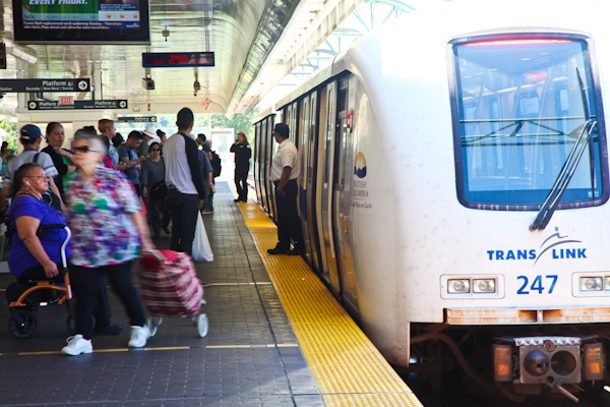Metro Vancouver students could be a key support base for the Yes side in the upcoming transit plebiscite if millennials overcome their digital rearing and embrace the vintage snail-mail aspect of the upcoming vote, says one university activist.
"Naturally, hearing that the referendum was a mail-in ballot was a little concerning initially," said University of B.C. student leader Bahareh Jokar.
"But we feel that we have strategies in place to mobilize students. We can give it a retro vibe, right? Remind students what it was like to mail in a ballot."
The vote on the $7.5-billion, 10-year transportation plan proposed by regional mayors is expected to be very close. The ballot asks whether Metro Vancouver residents are prepared to accept a 0.5 per cent "congestion tax" to fund transportation improvements across the region.
Students rely heavily on transit and are part of an age group increasingly less reliant on cars. "Some days when I wait for a bus on the Broadway corridor at peak hours," said Jokar, "I am getting passed up by five, six, seven buses -- and that's rough."
So students are seen as a natural pro-Yes vote constituency, which may be why Jokar was named one of four co-chairs of the Better Transit and Transportation Coalition, the umbrella group of business, labour, environmental and student groups backing the mayors' plan. The question is whether students will get registered, fill out the ballot and put it in the mail. Young voters typically vote in fewer numbers than other age demographics.
Pro-transit vibe
"It's our job as student leaders to make sure students know what is up and how to vote, when to vote -- and really push to break through the apathy," said Jokar. "This is about building a culture of civic engagement."
Jokar said there is strong pro-transit sentiment among the approximately 105,000 eligible students in Metro Vancouver. "The cost to the students is minimal when you compare it to the benefits. We estimate the cost would be $30-50 a year, depending on income levels and spending.
"And you are looking at a group of people who are becoming more and more dependent on public transit as the years go on. My generation isn't relying on cars as much as they did 10 or 20 years ago."
Jokar said that student leaders will be launching a series of events on post-secondary school campuses, aimed at getting students registered to vote in the plebiscite. "Students are very mobile, they move frequently and we need to make sure they receive a ballot at the location where they have been living for the last six months and are currently residing. "
Ballots are expected to begin arriving in mid-March and residents will have until May 29 to vote. Student activists are operating on a tighter timeline, trying to get out the campus vote before exams end in late April.
"We are going to have a really strong get-out-the-vote campaign, for sure," said Jokar, adding that student activists are hoping that Elections B.C. will designate sites where ballots can be delivered because many students don't know the location of local postal offices.
Jokar joined fellow leaders of the Better Transit and Transportation coalition Thursday at the pro-transit group's first public event in downtown Vancouver. Coalition co-chair Iain Black, CEO of the Vancouver Board of Trade, told the noon-hour rally that the plebiscite is a "generational opportunity" to deal with escalating congestion that is "suffocating our economy and stifling our growth."
Anger at TransLink
Black fielded questions from reporters about public anger over TransLink, the regional transportation agency -- and how these grievances are undermining the Yes side's campaign.
"It would be a mistake to treat this extraordinary opportunity as some sort of a plebiscite on one individual stand-alone government institution. We are talking about what our community is going to look like over the next 20 or 30 years."
Black added that the concerns about TransLink have been heard by politicians and that "I will be watching what is done about that in coming weeks and months."
Black said the transportation plan is "rare" because it received nearly unanimous backing of the region's mayors and because the provincial government has agreed to legislative safeguards requiring that money raised by the tax increase be used only for the projects set out in the plan. The mayors say the tax will generate $250 million annually for the projects, which include a subway for Vancouver, light rail for Surrey and more buses.
"Our opposition is speculative cynicism and we have to respond simply with the facts because they are on our side."
Another coalition co-chair Gavin McGarrigle, provincial director of the large union Unifor, said that workers understand that "saving 30 minutes a day in commute times means real savings and quality of life and more time with our loved ones."
McGarrigle said that Metro Vancouver can't "afford" to lose the vote to the No side.
"We can buy into a future where all taxes are bad, where public services are starved of funds, where our roads aren't upgraded and where transit can't keep up. And we can give into a future where the gloom of cynicism descends over the region like a stifling blanket while congestion increasingly costs us all more time and more money and more expensive choices down the road."
Another co-chair, Peter Robinson, CEO of the David Suzuki Foundation, said that the mayors' plan is the best way for Metro Vancouver to reduce greenhouse gas emissions.
"Improving transit and transportation is the most effective response we can make to climate change in this region. With more than one million people moving into Metro Vancouver in the next 25 years, investing in better transit and transportation is essential for a livable region," Robinson said.
"One million more people in the absence of an effective transit system, is 600,000 more cars. Clearly doing nothing is not an option." ![]()
Read more: Transportation, BC Politics

















Tyee Commenting Guidelines
Comments that violate guidelines risk being deleted, and violations may result in a temporary or permanent user ban. Maintain the spirit of good conversation to stay in the discussion.
*Please note The Tyee is not a forum for spreading misinformation about COVID-19, denying its existence or minimizing its risk to public health.
Do:
Do not: